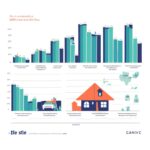For anyone, the acquisition of a house is a major life event and also one of the most important decisions that everyone will ever make in their lifetime. Hand in hand with the joy of the search for that perfect home people often forget about purchasing homeowners insurance. It is important to know how homeowners insurance works when buying a house. It operates at the time of purchase so that you can be shielded from specific dangers adequately. In buying a home, it is crucial to understand how homeowners insurance works, how it is used during the buying process, and why it’s important to protect that investment.
What is Homeowners Insurance?
Homeowners insurance is an indemnity policy that offers protection to the home and the property in it in case of loss through certain risks, theft, or if the homeowner is legally responsible for an injury to a third party in the home. It usually provides coverage for the physical house, a structure connected to the house, for example, a garage, and for household contents. Further, homeowners insurance also offers liability protection; this is coverage that will assist you if you’re legally at blame for an individual getting injured on your property.
In real estate, insurance is not merely a suggestion; in most cases, it is mandatory, especially where the buyer is to obtain a loan to finance the house purchase. Sellers need to provide insurance proof to lenders who wish to close on the property to avoid cases of losing the property to a disaster.
Why It is Important to Have Homeowners Insurance While Purchasing A House?
Knowledge of how homeowners insurance operates when planning to purchase a home is critical as this policy has its benefits assigned for the protection of both the homeowner and the financier. Here’s why it’s essential:
Protecting Your Investment: Your home is probably one of the biggest investments that you will make in your lifetime. This coverage guarantees that you will not be held liable for any financial losses that may occur due to fire, storm, or any other problem that is within the policy coverage. It also protects you and your belongings and assists in the replacement of items that have been stolen or destroyed.
Mortgage Lender Requirements: If you are going to use a loan to purchase a house, then the financial institution will compel you to provide the company with homeowners insurance. The lender also requires collateral in the form of property for in case anything happens to the property, he recovers his money. If they do not go for insurance, they can have the asset that was used as security for the loan taken from them.
Liability Protection: This policy has a liability that is very important when a person is injured in the homeowner’s compound. A slip-and-fall case or a dog attack can also be dealt with by liability coverage as it takes care of all the legal expenses, medical, and other damages that one would be forced to cater for themselves.
How Does Homeowners Insurance Work When Buying a House?
In the course of acquiring a home, insurance acts in several capacities that are crucial in home buying. This article provides insight on how homeowners insurance works while purchasing a house including getting a policy before closing and sustaining a policy during homeownership.
Securing a Policy Before Closing: Once you have done your search and settled on your dream home then you begin the process of buying the house and homeowners insurance. By and large, insurance is considered mandatory and even before a loan is granted, a borrower is supposed to provide for it. You will be required to choose from various available policies, compare the coverage plans that are offered, and then settle for the plan that is most suitable to you and to your lender.
Choosing the Right Coverage: To be able to choose a suitable homeowners insurance policy there is a need to be fully aware of the types of policies in the market. Most standard policies cover:
- Dwelling Coverage: Preserves your home’s structure and integrity.
- Other Structures Coverage: This also pertains to detached structures such as garages, sheds, and other similar structures.
- Personal Property Coverage: Protects your personal belongings.
- Liability Coverage: Gives cover if there is an incident involving causing harm to anybody on your compound.
- Loss of Use Coverage: Covers other expenses for living if your home cannot be lived in as a result of a given event.
As for the question – of how homeowners insurance works when buying a house, one must get enough money to rebuild the house in case of a total loss and enough money to replace things inside.
Paying the Premium: After knowing your options on how to get your homeowners insurance there are other ways through which you can make your premium payments. If your home is financed, the most common procedure is that the premium amount is charged to your mortgage. This is called an escrow account where you pay a part of your monthly mortgage fee which goes into the account and pays your insurance premium and your property taxes. This makes sure that your insurance stays valid and your financier is shielded.
Updating Coverage Over Time: Rather, homeowners insurance is not a ‘buy once’ product. And of course, if your home value is increasing, or in cases when you make large renovations or purchases, you’ll have to re-elevate your policy. Some of these things to know for those who are asking how homeowners insurance works when buying a house are: when to review and reconcile your coverage? It will also help you in the event of a claim that your policy is up to date hence providing adequate cover.
Features To Consider While Choosing A Homeowner Insurance
Selecting the type of homeowners insurance policy is amongst the most significant factors that define the level of the homeowner’s protection. Here are some factors to consider: Here are some factors to consider:
- Coverage Limits: Standard limits on the policy should be increased to enable the policy owner to recover the costs of home reconstruction, as well as replacement of all lost items. A wise person should consider opting for replacement cost coverage, and not actual cash value which factors in depreciation.
- Deductibles: Your deductible is the amount of money that you are required to pay before the insurance company starts contributing. The price you agree to pay for coverage is cheaper with higher deductible plans but you end up paying more from your pocket in the event of a claim. Select an appropriate deductible that will be cheapest to the client yet will provide optimal coverage.
- Exclusions: If there are exclusions to what your insurer will consider to pay, it is good to know what these are. Most standard policies of homeowners insurance do not cover floods and earthquakes. For those persons who reside in certain areas, it is wise you secure supplementary coverage.
- Discounts: Inquire if there are any possible discounts: for having both car and homeowners/renters insurance, for installing a burglar alarm system, or if it has been a couple of years since making a claim. These can help in lowering your premium.
The homeowner’s insurance after closing is the most significant expense category, and therefore, its motion should be carefully monitored.
The Role of Homeowners Insurance After Closing
One of the most crucial steps of being a homeowner is keeping your homeowners insurance in force after you have closed on the property. You should always read your policy to see if it fits into your current standard. In case you change your mortgage relocate to a new home or update your house, then you will need to alter your policy.
Now knowing the workings of the homeowner’s insurance when purchasing a house does not end at the closing table, it is more of a management endeavor to secure the property. Should the time come that you have to file a claim, your homeowner’s insurance will help you financially in terms of repair or rebuilding of the house, replacement of your things, or in the case that you are made to pay for the damages that you have done.
Conclusion
Owning a house is always a big achievement and how does homeowners insurance work when buying a house, there is no better feeling than having the perfect homeowners insurance. Most people will agree that this information is important to review because this way when selecting a homeowners insurance policy, one will know how it works. As you wait to close the policy to get the right amount and type of coverage as your home value evolves, homeowners insurance is protective of your investment. If you select the right policy and also consider going through the policy coverage from time to time, your home and belongings will be insured against life hitches.







